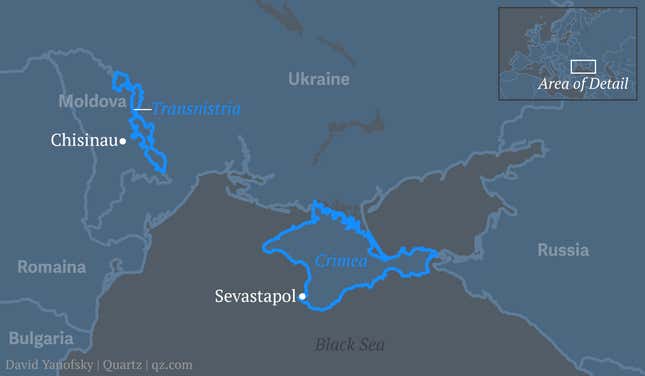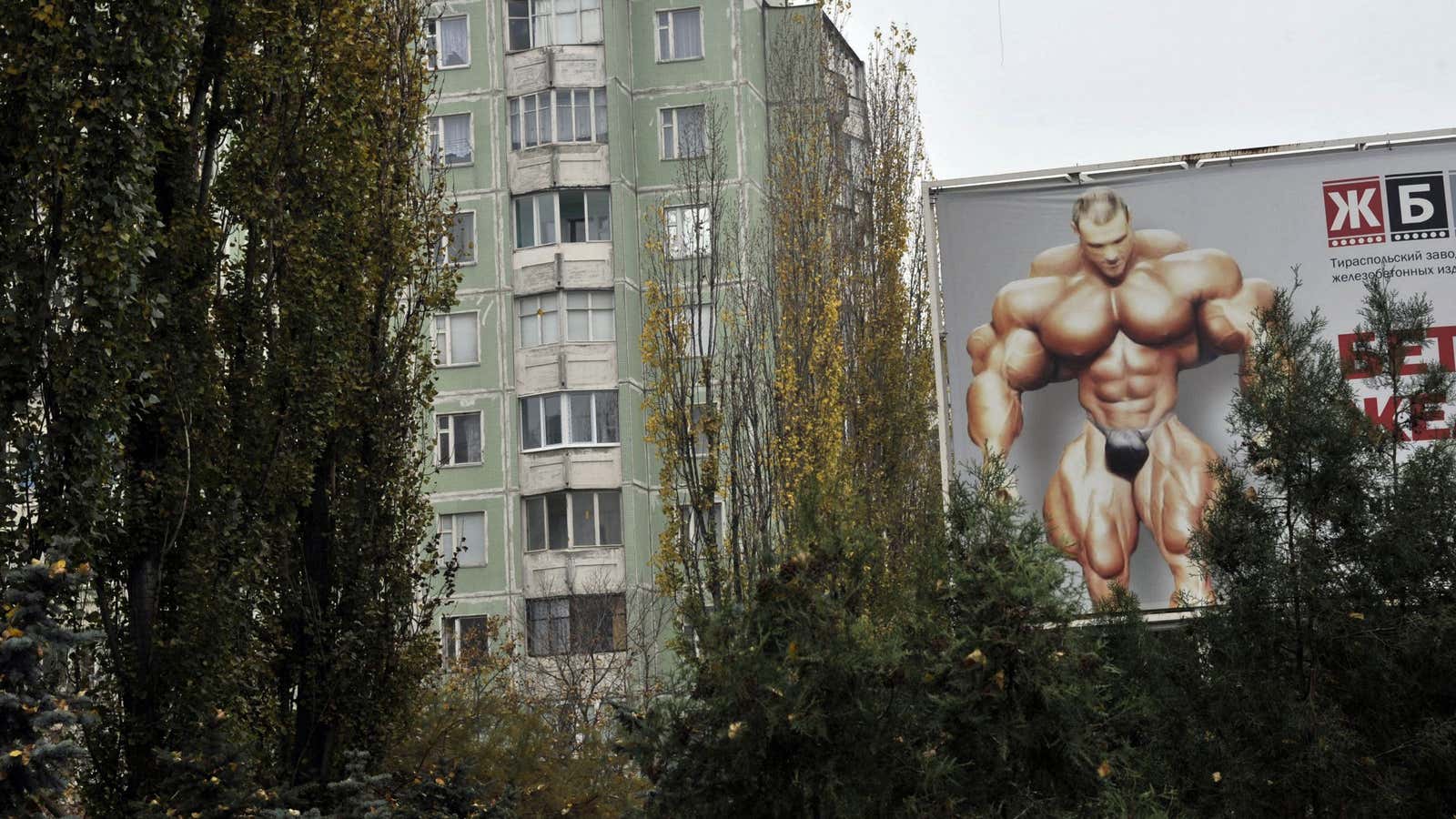With Russia’s annexation of Crimea essentially a done deal, NATO and the US are warning that Transnistria—a breakaway province of Moldova, on Ukraine’s western border—may be the next sliver of land to be absorbed by Russia at the invitation of an unrecognized government. The quasi-independent state has a feeble legitimate economy and a booming underground trade in illicit goods. More importantly, it has been propped up by Moscow for two decades.
Transnistria (also known as Trans-Dniester, because it spans the Dniester river) declared independence from Moldova after the break-up of the Soviet Union, though no other countries—not even Russia—officially recognize it. Since a brief and bloody civil war, the ethnic Russian-majority quasi-state has maintained the auspices of its own government and international borders. It also hosts some 2,000 Russian troops, who are there as supposedly temporary peacekeepers.

The official economy
The above-board Transnistrian economy is relatively small, with a gross domestic product of about $1 billion. More than half comes from several huge Soviet-era industrial plants—mostly controlled by Russian companies—that export steel, cement, and textiles. Much of the rest of the region’s GDP comes from remittances, mostly from Russia. Transnistria’s unofficial status means that its currency is useless outside of its borders. And its population fell by one-third between 1990 and 2013, to around 500,000.
“Transnistria is almost completely devoid of any of the internal prerequisites necessary for economic growth,” the Warsaw-based Centre for Eastern Studies (CES) concluded. But that doesn’t mean there isn’t any economic action—it’s just off the books, and heavily intertwined with Russian interests.
The natural-gas scam
Russia’s official humanitarian aid to Transnistria isn’t large—it mostly covers the cost of Soviet pensions for the 30% of the population who are past retirement age. Russia’s actual funding is much more ingenious, in a devious sort of way.
The Transnistria natural gas company, TiraspolTransGaz-Pridnestrovye, receives two-thirds of the gas that is sent to Moldova by the state-controlled Russian firm Gazprom—and then simply refuses to pay its hefty bill. CES estimates that this covert subsidy amounted to $272 million in 2012; the total unpaid gas bill, which Gazprom has never tried to collect, is worth about $3.7 billion.
A smuggler’s paradise
Being a no man’s land has its advantages, and smuggling has long been a central pillar of the Transnistrian economy. It runs the gamut from garden-variety contraband like cigarettes and chicken—enough chicken is imported annually to feed each resident nine times as much as the average German eats —to more sinister activities like the trafficking of women who are forced into prostitution.
“The authorities are entrenched in the territory’s economic activities, which rely in large part on smuggling schemes designed to evade Moldovan and Ukrainian import taxes,” the NGO Freedom Watch wrote in 2011. An EU report described the territory as a “black hole” where the “illegal trade in arms, the trafficking in human beings and the laundering of criminal finance” is rife.
Weapons for sale…
Transnistria is awash with munitions, including an estimated 20,000 to 40,000 tonnes of Soviet-era weaponry, according to the Organization for Security and Cooperation in Europe, and an unknown number of munitions factories whose wares have been traced to conflicts in Iraq and Afghanistan.
…including possible dirty bombs
Moldovan officials arrested six people, including two Transnistrians, for selling one kilogram (2.2 pounds) of highly enriched uranium to undercover police posing as North African buyers. Russian officials disparaged the Moldovan account, saying the purported €20 million ($27.6 million) price was “way too low.”
A bridge to nowhere
Geography is a hurdle to Transnistria’s annexation—unlike Crimea, Russia can’t simply build a bridge from the mainland. But Kaliningrad, a Russian exclave sandwiched between Poland and Lithuania on the Baltic Sea—and which also happens to be known for smuggling—could provide the template.
